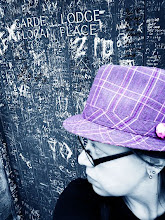Title: Do Androids Dream of Electric Sheep?
Author: Philip K. Dick
Published: Originally in 1968
Genre: Science Fiction
Pages: 210
Summer holiday. What a wonderful reason to avoid the computer. But it's almost time to go back to work, and to return books to the library.
As y'all probably know, this is Philip K. Dick's classic science fiction novel, and it inspired Ridley Scott's film Blade Runner. (Apparently, 'Have you seen Blade Runner?' is a silly question. Because everyone has.) It has been yeeears since I saw the film, but I'm pretty sure that Harrison Ford wasn't much obsessed with his electric sheep, and getting a real animal. But, like, 20 years. I can barely remember yesterday.
The world has been damaged by the latest world war, and a lot of humanity has already migrated off the planet. A few still stay, as almost the only living things. Animals are endangered or extinct, and owning one is a huge status symbol, and a proof of one's humanity. Rick Deckard, our protagonist, only has an electric sheep. Rick is a bounty hunter, and is calculating that after he retires (=destroys) a group of 6 escaped androids, he should be able to buy a real animal. But the androids in question are very human-like, and not so easy to kill. Alongside the main plot, the book brings out a lot of questions on what a human is, and how the androids are different.
If it was explained in the book I missed (or forgot) it, but I'm unsure as to why the bounty hunters
After a hurried breakfast - he had lost time due to the discussion with his wife - he ascended clad for venturing out, including his Ajax model Mountibank Lead Codpiece, to the covered roof pasture whereon his electric sheep 'grazed.' Whereon it, sophisticated piece of hardware that it was, chomped away in simulated contentment, bamboozling the other tenants of the building.
Of course, some of their animals undoubtedly consisted of electronic circuitry fakes, too; he had of course never nosed into the matter, any more than they, his neighbors, had pried into the real workings of his sheep. Nothing could be more impolite. To say, 'Is your sheep genuine?' would be a worse breach of manners than to inquire whether a citizen's teeth, hair, or internal organs would test out authentic.

Ei kommentteja:
Lähetä kommentti